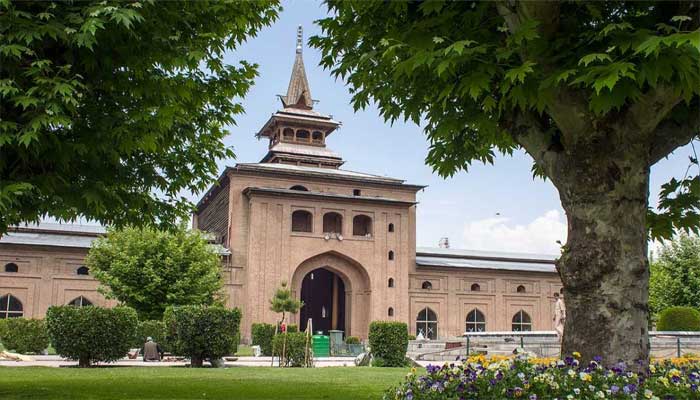600-year-old Srinagar Jamia Masjid’s Imam detained at home for last two years
SRINAGAR: Jamia Masjid, the grand mosque of Srinagar, dominates its neighborhood with an imposing main gate and massive turrets. It can hold 33,000 worshippers, and on special occasions over the years hundreds of thousands of Muslims have filled nearby lanes and roads to offer prayers led from the mosque, foreign media reported on Thursday. But Indian authorities see the mosque as a trouble spot — a nerve center for protests and clashes that challenge India’s sovereignty over the Indian Illegally Occupied Jammu and Kashmir (IIOJ&K).
For Kashmiri Muslims it is a sacred venue for Friday prayers and a place they can raise their voices for political rights. In this bitter dispute, the mosque in Kashmir’s main city has largely remained closed for the past two years. The mosque’s chief cleric has been detained in his home almost nonstop throughout that time, and the mosque’s main gate is padlocked and blocked with corrugated tin sheets on Fridays.
The closure of the mosque, which is revered by Kashmir’s mostly Muslim population, has deepened their anger. “There is a constant feeling that something is missing in my life,” said Bashir Ahmed, 65, a retired government employee who has offered prayers at the mosque over five decades. In the past, officials have said the government was forced to close themosque because its management committee was unable to stop anti-India protests on the premises.
-
 Savannah Guthrie Sends Desperate Plea To Mom Nancy Kidnapper
Savannah Guthrie Sends Desperate Plea To Mom Nancy Kidnapper -
 NBA All-Star 2026 Shake-up: Inside The New USA Vs World Tournament Format
NBA All-Star 2026 Shake-up: Inside The New USA Vs World Tournament Format -
 Warner Bros Consider Reopening Deal Talks With Paramount, Says Reports
Warner Bros Consider Reopening Deal Talks With Paramount, Says Reports -
 Andrew Mountbatten Windsor Faces Future With UK MPs, Says Expert
Andrew Mountbatten Windsor Faces Future With UK MPs, Says Expert -
 Shamed Andrew Told 'nobody Is Above The Law' Amid Harrowing Silence
Shamed Andrew Told 'nobody Is Above The Law' Amid Harrowing Silence -
 Gisele Bundchen Melts Hearts With Sweet Bike Ride Glimpse Featuring Son
Gisele Bundchen Melts Hearts With Sweet Bike Ride Glimpse Featuring Son -
 Prince William Found Meghan Markle ‘quite Refreshing’ At Start
Prince William Found Meghan Markle ‘quite Refreshing’ At Start -
 Kate Middleton Knew Should Could Not Be ‘voice Of Reason’ With Prince Harry
Kate Middleton Knew Should Could Not Be ‘voice Of Reason’ With Prince Harry -
 Rihanna Has Wardrobe Malfunction At A$AP Rocky Fashion Show
Rihanna Has Wardrobe Malfunction At A$AP Rocky Fashion Show -
 Prince Harry Felt System Had ‘one Rule For Him, One For Prince William’
Prince Harry Felt System Had ‘one Rule For Him, One For Prince William’ -
 Jake Paul's Fiancée Sends Him Over The Moon Over Stunning Victory
Jake Paul's Fiancée Sends Him Over The Moon Over Stunning Victory -
 Harper Beckham Sends Valentine’s Love Amid Brooklyn Family Drama
Harper Beckham Sends Valentine’s Love Amid Brooklyn Family Drama -
 Why Prince William, Kate Middleton 'partnership' Is Important For Monarchy
Why Prince William, Kate Middleton 'partnership' Is Important For Monarchy -
 Katie Price Drama Escalates As Family Stays In Touch With Ex JJ Slater
Katie Price Drama Escalates As Family Stays In Touch With Ex JJ Slater -
 Critics Target Palace Narrative After Andrew's Controversy Refuses To Die
Critics Target Palace Narrative After Andrew's Controversy Refuses To Die -
 Sarah Ferguson’s Delusions Take A Turn For The Worse: ‘She’s Been Deserted’
Sarah Ferguson’s Delusions Take A Turn For The Worse: ‘She’s Been Deserted’




